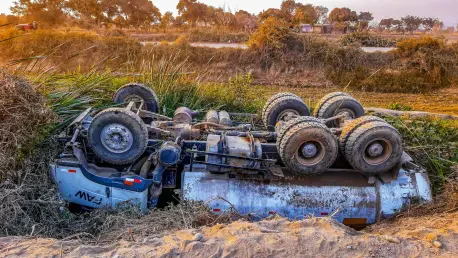Fixed version:
In a heartbreaking legal battle unfolding in Texas, a fatal cement truck accident has sparked a contentious dispute between Progressive County Mutual Insurance Co., a subsidiary of a major insurance provider, and Tycoon Ready Mix LLC. The tragedy, which claimed the life of Luis Miguel Cantu at an intersection collision, has led to a wrongful death lawsuit and raised complex questions about insurance coverage in commercial trucking operations. At the heart of this case is whether Progressive is obligated to defend or pay damages for Tycoon in the ongoing litigation. Filed in Harris County District Court, Progressive’s request for a declaratory judgment seeks to absolve the insurer of responsibility, citing specific policy exclusions. This case not only highlights the personal loss endured by Cantu’s family but also exposes critical gaps in how liability is assigned in intricate business relationships within the transportation industry, setting the stage for a potentially precedent-setting ruling.
Legal Arguments Over Policy Exclusions
The crux of Progressive’s stance rests on the assertion that the cement truck involved in the fatal accident, owned by Nava Ready Mix, was not among the eight vehicles explicitly covered under Tycoon’s commercial auto policy. According to the insurer, the policy terms are clear: coverage applies only to claims arising from the ownership, maintenance, or use of a listed automobile. Since the truck in question falls outside this scope, Progressive argues it bears no obligation to provide defense or damages in the wrongful death lawsuit filed by Patricia Cantu on behalf of her husband’s estate. Furthermore, the insurer contends that the lawsuit focuses on Tycoon’s alleged negligence in hiring and supervising Nava Ready Mix and its driver, rather than any direct connection to a covered vehicle. This narrow interpretation of the policy language underscores a strict approach to limiting financial exposure, a tactic that could influence how similar disputes are resolved in commercial insurance contexts across Texas.
Beyond the issue of unlisted vehicles, Progressive challenges the applicability of a specific policy endorsement known as “Form F,” which is designed to comply with Texas transportation regulations for commercial motor carriers. The insurer argues that Tycoon was not functioning as a motor carrier at the time of the accident but instead acted as a contractor hiring Nava Ready Mix to perform the job. This distinction is pivotal, as it could determine whether the endorsement extends coverage to the incident. If Tycoon is deemed merely a contractor, Progressive’s position to deny coverage might hold stronger ground in court. The nuanced debate over roles and responsibilities in this case reflects broader uncertainties in the industry about how liability is shared between entities in complex contractual arrangements, potentially impacting future interpretations of insurance obligations for businesses operating in transportation and logistics.
Implications of Commercial Roles and Liability
A significant aspect of this legal dispute lies in the blurred lines between the roles of motor carriers and contractors under Texas law, a distinction that could redefine coverage responsibilities. The wrongful death lawsuit, amended most recently in early 2024, accuses Tycoon of failing to enforce adequate safety protocols and properly oversee the contractor involved in the crash. Progressive’s argument hinges on the idea that such negligence falls outside the scope of its policy, as it does not directly relate to a covered vehicle’s use. This perspective raises critical questions about how far an insurer’s duty extends when a policyholder engages third-party contractors. The outcome of this case could set a benchmark for how courts interpret the responsibilities of companies like Tycoon, particularly in high-risk industries where safety oversights can lead to devastating consequences, influencing future legal frameworks for liability allocation.
Moreover, the case sheds light on a larger trend in insurance law concerning the strict interpretation of policy terms and endorsements in multifaceted commercial relationships. Progressive’s reliance on technical definitions to deny coverage exemplifies a growing emphasis on precise policy language over broader considerations of intent or context. While Tycoon’s perspective remains absent due to a lack of response from representatives, the insurer’s position, articulated through counsel at a prominent law firm, dominates the current narrative. This imbalance highlights the challenges smaller entities may face when disputing coverage with large insurers. The resolution of this matter could prompt regulatory or industry-wide discussions about the need for clearer guidelines on coverage in commercial trucking, ensuring that tragic incidents like this one lead to fairer accountability rather than prolonged legal battles over technicalities.
Reflecting on Broader Impacts
Looking back, the dispute between Progressive and Tycoon Ready Mix captured attention for its deep dive into the intricacies of commercial insurance coverage following a tragic loss. The legal arguments presented by the insurer revealed a rigid stance on policy exclusions that tested the boundaries of liability in Texas trucking operations. The wrongful death lawsuit, driven by a family’s pursuit of justice, became intertwined with a complex debate over contractual roles and responsibilities that had no easy answers. This case stood as a somber reminder of the human toll behind legal proceedings, where the loss of life fueled a broader examination of safety and oversight in high-stakes industries. As the court’s ruling loomed, the potential ripple effects on similar disputes remained a point of keen interest among legal and industry observers.
In moving forward, the resolution of this matter could pave the way for actionable reforms in how insurance policies are drafted and interpreted for commercial entities. Stakeholders might consider advocating for more explicit terms regarding third-party contractor liabilities to prevent future coverage disputes. Additionally, state regulators could explore enhanced safety mandates for companies hiring external operators, ensuring that accountability is not lost in legal loopholes. The lessons drawn from this case might inspire a collaborative effort among insurers, businesses, and lawmakers to address ambiguities in transportation regulations, ultimately striving to balance fair coverage with the prevention of tragic accidents. This ongoing saga, rooted in a profound personal loss, serves as a call to refine systems that protect both lives and livelihoods in a critical sector.









